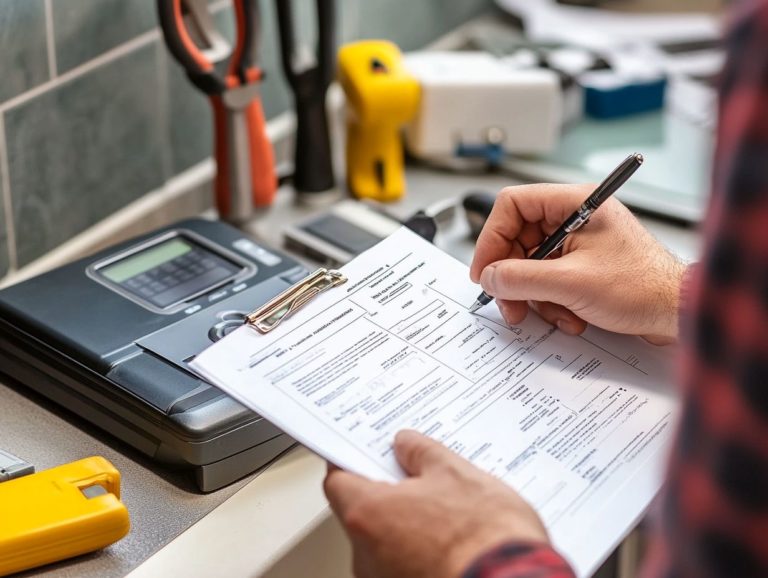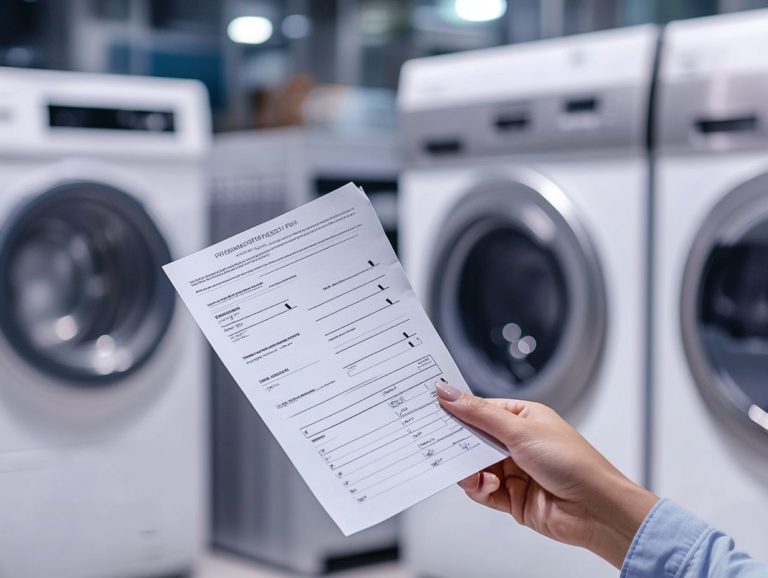5 Best Practices for Car Warranty Management
Navigating the realm of car warranties can often feel like a maze. However, mastering the art of effective management can save you both time and money.
Get ready to discover five best practices that will transform how you manage your car warranty! This article ensures you maximize your coverage while steering clear of common pitfalls.
From grasping the specifics of your warranty to maintaining meticulous records, you ll uncover vital information that empowers you.
You will also explore various types of warranties and learn how to extend them. Prepare yourself to become a savvy warranty manager!
Contents
- Key Takeaways:
- 1. Understand the Coverage of Your Warranty
- 2. Keep Track of Your Warranty Documents
- 3. Follow the Recommended Maintenance Schedule
- 4. Keep Records of All Repairs and Services
- 5. Know How to File a Claim
- What Is a Car Warranty and Why Is It Important?
- Frequently Asked Questions
- What are the 5 best practices for car warranty management?
- Why is keeping in touch regularly important in car warranty management?
- How does thorough record keeping benefit car warranty management?
- Why is timely claims processing crucial in car warranty management?
- What is the importance of regular review of warranty policies?
- How does training for employees play a role in car warranty management?
Key Takeaways:

- Understand your car warranty coverage to avoid unexpected costs.
- Keep track of documents and repair records for easy claims.
- Follow the maintenance schedule to save money long-term.
1. Understand the Coverage of Your Warranty
Understanding the nuances of your warranty coverage is essential for effective warranty management. It dictates what s included and excluded, directly influencing your warranty costs and customer satisfaction in the automotive sector.
By fully grasping the warranty terms, you can make informed decisions that enhance your experience. This knowledge doesn’t just benefit you; it also helps manufacturers build trust and reliability in their products.
Being well-informed about warranty coverage can significantly affect how claims are filed and managed. When you understand your rights and limitations, you re more likely to file claims accurately and on time.
Using mobile technology and tools for warranty registration can simplify the process, giving you easier access to your information and necessary documentation. This tech integration elevates customer service by providing real-time support.
2. Keep Track of Your Warranty Documents
Maintaining a clear record of your warranty documents is crucial for hassle-free claims processing. These documents are your key proof of warranty registration and coverage.
Organizing these papers reduces the likelihood of losing them and simplifies retrieval during the often stressful claims process. Embracing digital storage options, like cloud services, significantly enhances accessibility.
By routinely auditing and updating your stored information, you minimize discrepancies during claims. This meticulous attention to detail impacts the speed at which your claims are processed.
3. Follow the Recommended Maintenance Schedule
Following the recommended maintenance schedule is crucial for ensuring product quality and preserving your automotive warranty. Neglecting routine checks can lead to issues that void your coverage.
Regular servicing typically includes oil changes, tire rotations, and inspections of essential systems such as brakes and fluids. Adhering to this schedule extends your vehicle’s lifespan and cultivates a reliable driving experience.
Addressing repairs promptly diminishes the risk of major breakdowns. Many manufacturers state that failing to follow maintenance guidelines can impact warranty claims, making routine care a wise investment.
Now that you know how to manage your car warranty effectively, start implementing these tips to maximize your warranty benefits today to save time and money!
4. Keep Records of All Repairs and Services

Maintaining detailed records of all repairs and services is essential for effective warranty management. These documents substantiate your claims and provide vital support for car warranty insights if disputes arise.
Include invoices and service logs detailing what was performed during each visit and any parts replaced. These records ensure you have necessary documentation to back up your claims.
Accurate record-keeping enhances communication with service technicians. They can grasp the complete history of services, leading to quicker resolutions.
Easy access to your records boosts your satisfaction, reinforces trust in services, and fosters long-term relationships.
5. Know How to File a Claim
Understanding how to manage multiple car warranties efficiently is vital in warranty claims management. This knowledge influences the speed and success of securing repairs or reimbursements while controlling warranty costs.
By knowing the step-by-step claims process, you can elevate your experience and avoid delays. Start by gathering all necessary documentation like receipts and warranties.
When contacting customer service, present a clear description of the issue. This enhances effective communication.
Common pitfalls include inadequate documentation and missing deadlines. To ensure a smoother claims experience, keep a detailed log of your interactions with customer service.
What Is a Car Warranty and Why Is It Important?
A car warranty is a promise from manufacturers to cover specific repairs and services. This assurance provides peace of mind and enhances your satisfaction, an essential factor in the automotive industry.
This protection includes various types of coverage, such as bumper-to-bumper and powertrain warranties. Each targets different aspects of your vehicle s performance and can last from a few years to tens of thousands of miles.
A strong warranty means less financial risk for you. For manufacturers, it s a tool for managing warranty costs and setting realistic service expectations.
What Are the Different Types of Car Warranties?
Consider several types of car warranties: manufacturer s warranties, extended warranties, and powertrain warranties. Each serves a unique purpose and offers specific benefits.
Understanding these differences is essential for securing the best protection for your vehicle. Manufacturer s warranties offer comprehensive coverage for new vehicles, covering defects in materials and workmanship.
Extended warranties suit older cars or those beyond their manufacturer s coverage, providing peace of mind against unexpected repair costs.
Powertrain warranties focus on the engine and transmission, ideal for those concerned about major mechanical failures. Choose a policy that aligns with your driving habits and financial considerations for an enhanced ownership experience.
What Should You Look for in a Car Warranty?

When evaluating a car warranty, consider several key factors. Look at how much it covers, what’s not covered, duration, and warranty costs. These aspects play a vital role in your satisfaction and financial protection when claims arise.
It s also essential to check customer service ratings. Prompt and helpful support can ease the stress of handling repairs. Equally important is the ease of claims processing. A straightforward process means quicker resolutions and less downtime, which enhances your experience.
The reputation of the service provider and their track record in honoring claims significantly influence your confidence in the warranty. Together, these factors contribute to effective warranty management, ensuring you enjoy peace of mind throughout your journey.
How Can You Extend Your Car Warranty?
Extending your car warranty can provide you with invaluable peace of mind and financial protection. It safeguards your assets against unexpected repair costs that often arise once the manufacturer’s warranty expires.
The journey typically starts with assessing your eligibility. Factors like your vehicle s age, mileage, and maintenance history often determine this. Many automotive companies offer a variety of extended warranty options tailored to meet diverse needs, making it easier for you to find a suitable plan.
Although there may be costs involved, investing in an extended warranty can lead to significant savings when facing expensive repairs. Good warranty management streamlines the extension process and enhances your overall experience, fostering confidence and satisfaction in your vehicle investment.
What Are the Common Mistakes to Avoid with Car Warranties?
Avoid several common mistakes when it comes to car warranties. These include not reading the fine print, failing to register the warranty, and neglecting to follow maintenance guidelines. For more insights, consider the 5 essential factors in choosing a warranty. Each of these oversights can hinder your warranty claims and customer service experiences.
Many car owners overlook these critical aspects, leading to unexpected challenges when filing a claim. For instance, skipping the fine print can cause misunderstandings about coverage limitations, leaving you unprotected during crucial moments. Additionally, if you fail to register the warranty, you risk voiding the coverage, which can leave you with substantial financial responsibility.
Neglecting maintenance guidelines can lead to claim denials, as most warranties require regular service checks to remain valid. To avoid these pitfalls, read your warranty documents thoroughly, ensure timely registration, and follow the specified maintenance schedules. This proactive approach will create a smoother experience when utilizing those valuable protections.
How Can Proper Car Warranty Management Save You Money?
Effective car warranty management can unlock significant savings by reducing warranty costs, streamlining the claims process, and enhancing customer satisfaction through the best practices for maintaining warranty coverage through proactive measures.
By adopting strategies like establishing regular maintenance schedules and keeping detailed service records, you can ensure you’re well-covered while avoiding unexpected repair expenses. Accurate records not only expedite claims processing but also strengthen your position for warranty coverage in case of disputes. Additionally, consider exploring 5 ways to save money on car warranties for further financial advantages.
These practices create a seamless experience for you as a consumer and positively impact the financial health of a business, as fewer warranty claims lead to improved profit margins.
Mastering warranty management builds trust and keeps customers coming back!
Frequently Asked Questions

What are the 5 best practices for car warranty management?
Here are five best practices for managing car warranties:
- Keep in touch regularly.
- Maintain thorough records.
- Process claims quickly.
- Review policies often.
- Train your staff well.
Why is keeping in touch regularly important in car warranty management?
Keeping in touch with customers builds trust. This can boost customer satisfaction and loyalty.
How does thorough record keeping benefit car warranty management?
Detailed records of claims and repairs help spot patterns. They also serve as proof in disputes.
Why is timely claims processing crucial in car warranty management?
Processing claims quickly keeps customers happy and controls costs. Delays can lead to higher expenses and unhappy customers.
What is the importance of regular review of warranty policies?
Reviewing warranty policies regularly keeps them relevant. It also helps spot gaps and make improvements.
How does training for employees play a role in car warranty management?
Trained employees are key to managing warranties well. They need to understand policies to assist customers efficiently.





